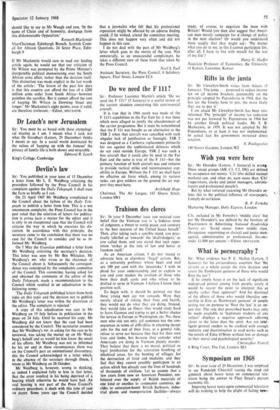Trahison des clercs
Sir: In your 8 December issue you restated your belief that the Vietnam war is 'a hideous error of judgment, a threat to world peace, and contrary to the best interests of the United States herself.' Then, after taking such a sensible stand, you prac- tically labelled as 'cowards' the tdraft-dodgers,' as you called them, and you stated that such oppo- sition 'strikes at the rule of law and hence at freedom itself;
As an American citizen. I do not intend to advocate here or elsewhere 'illegal' actions. But, as a university professor 'whose heart and soul are 100 per cent with the 'peaceniks,' I wish to plead for your understanding and to explain to yOu and your readers the position of those who burn their draft cards and who refuse to be drafted to serve in Vietnam. I believe 1 know their position well.
To begin with. it should be pointed out that these young men are not cowards. Were they merely afraid of risking their lives and health, they would not do what they are doing. Instead, they would fake an illness, they would study hard to learn German and typing to get a better chance for service in Europe or Washington, etc. No, these men who- risk not only jail sentences but the con- sequences in terms of difficulties in attaining decent jobs for the rest of their lives, as a general rule, refuse to serve not because they fear for their own lives and limbs, but because they consider what Americans are doing in Vietnam plainly murder. They believe that there is no moral, political or legal justification for the saturation bombing of inhabited areas, for the burning of villages, for the destruction of food and medicine, and they feel that they cannot possibly participate in an action which has already cost the lives of hundreds of thousands of civilians. Let us assume that- a few years from now an American President, em- bittered over the supply of British materials of one kind or another to communist countries, de- cides to saturation-bomb British harbours, indus- trial plants and transportation ttcilities—always ready, of course, to negotiate the issue with Britain! Would you then also utmost that Ameri- can men merely campaign for rechange of policy in the next election? Or would you understand more readily that they might say: 'No matter what you do to me, in this I cannot participate for, after all, I have to live with myself for the rest of my life'?
Harry G. Shaffer Associate Professor of Economics, the University of Kansas, Lawrence, Kansas






























 Previous page
Previous page